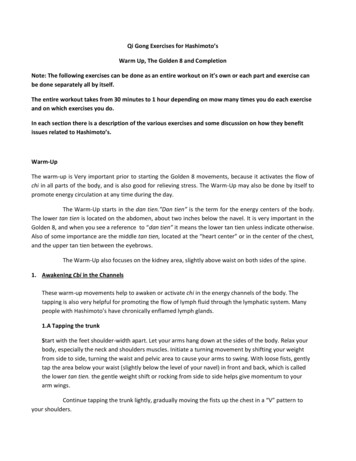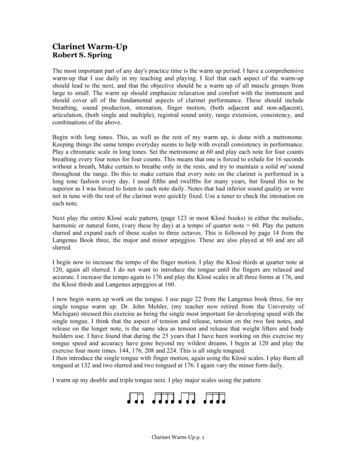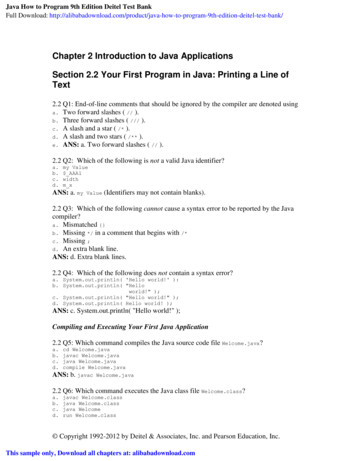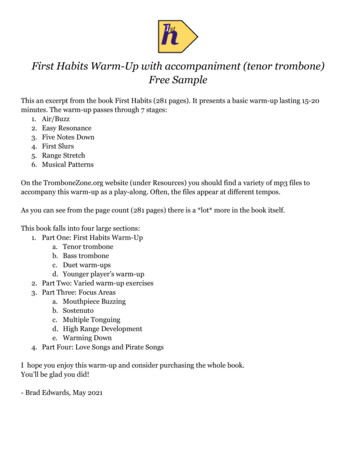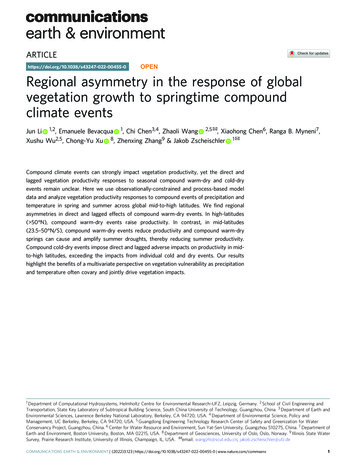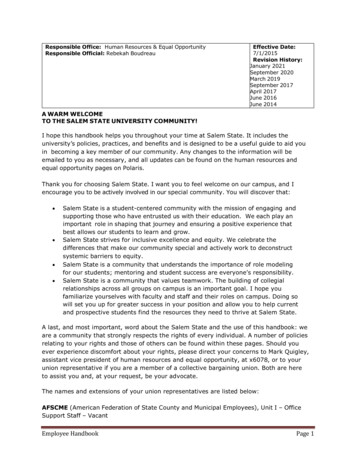
Transcription
Responsible Office: Human Resources & Equal OpportunityResponsible Official: Rebekah BoudreauEffective Date:7/1/2015Revision History:January 2021September 2020March 2019September 2017April 2017June 2016June 2014A WARM WELCOMETO THE SALEM STATE UNIVERSITY COMMUNITY!I hope this handbook helps you throughout your time at Salem State. It includes theuniversity’s policies, practices, and benefits and is designed to be a useful guide to aid youin becoming a key member of our community. Any changes to the information will beemailed to you as necessary, and all updates can be found on the human resources andequal opportunity pages on Polaris.Thank you for choosing Salem State. I want you to feel welcome on our campus, and Iencourage you to be actively involved in our special community. You will discover that: Salem State is a student-centered community with the mission of engaging andsupporting those who have entrusted us with their education. We each play animportant role in shaping that journey and ensuring a positive experience thatbest allows our students to learn and grow.Salem State strives for inclusive excellence and equity. We celebrate thedifferences that make our community special and actively work to deconstructsystemic barriers to equity.Salem State is a community that understands the importance of role modelingfor our students; mentoring and student success are everyone’s responsibility.Salem State is a community that values teamwork. The building of collegialrelationships across all groups on campus is an important goal. I hope youfamiliarize yourselves with faculty and staff and their roles on campus. Doing sowill set you up for greater success in your position and allow you to help currentand prospective students find the resources they need to thrive at Salem State.A last, and most important, word about the Salem State and the use of this handbook: weare a community that strongly respects the rights of every individual. A number of policiesrelating to your rights and those of others can be found within these pages. Should youever experience discomfort about your rights, please direct your concerns to Mark Quigley,assistant vice president of human resources and equal opportunity, at x6078, or to yourunion representative if you are a member of a collective bargaining union. Both are hereto assist you and, at your request, be your advocate.The names and extensions of your union representatives are listed below:AFSCME (American Federation of State County and Municipal Employees), Unit I – OfficeSupport Staff – VacantEmployee HandbookPage 1
AFSCME (American Federation of State County and Municipal Employees), Unit II –Custodial, Trades and Campus Police – Larry Noel, x6015APA (Association of Professional Administrators, Massachusetts Teachers Association) –Administrators – Michael Pelletier, x2853 or APA@salemstate.eduMSCA (Massachusetts State University Association, Massachusetts Teachers Association) –Faculty (day and evening) and Librarians – Professor Tiffany Chenault, Salem chapterpresident, x6263; Professor Anne-Marie Hakstian, grievance officer, x6823.I am pleased that you have chosen to become a member of our community and wish youwell as we work together to provide our students the best possible experience.Best Regards,John D. KeenanPresidentEmployee HandbookPage 2
If you have comments or suggestions as to how this handbook can be more useful, pleasecontact the assistant vice president of human resources and equal opportunity.Table of ContentsA WARM WELCOME . 1Policy Information . 7Notice Concerning Employment . 7Equal Employment Opportunity and Affirmative Action . 7Discrimination, Discriminatory Harassment and Retaliation . 7Employees with Disabilities . 8Sexual Harassment . 8Acceptable Use and Information Security Policies . 8Alcohol and Substance Abuse . 9Campus Security and Right-to-Know Act . 9Emergency Policy and Procedures . 9Conflict of Interest . 9State Ethics . 10Political Activity . 10Tobacco-Free Campus . 10Social Security Numbers . 11Hiring Policy and Procedures . 11Employee Data Changes . 12Personnel Records . 12Employee Liability Coverage. 12Inclement Weather and Emergency Closing . 12Parking . 13Commuting . 13Performance Evaluations . 13Unions . 14Deferred Compensation Program . 14Dental Care Insurance . 15Dependent Care Assistance Program . 15Health Care Spending Account (HCSA). 15Employee HandbookPage 3
Health Insurance . 15Life Insurance . 16Long-Term Disability Insurance . 16Retirement Plan . 16Social Security . 16Tax-Deferred Compensation Program 457(b) . 16Tax-Sheltered Annuities . 16Tuition Waivers/Remissions . 17Unemployment Compensation . 17Workers’ Compensation Insurance . 17Leave Benefits . 18Administrators’ Leave Benefits (APA), Summary of . 18Administrators’ Leave Benefits (NON-UNIT), Summary of . 20Classified Staff Leave Benefits (AFSCME and Non-Unit), Summary of . 20Faculty/Full-Time and Librarian Leave Benefits (MSCA), Summary of . 22Family and Medical Leave Act (FMLA) . 24Holidays . 25Jury Duty . 25Other Leaves . 25Small Necessities Leave Act (SNLA) . 25University Services . 26Bookstore. 26Center for Civic Engagement . 26ClipperCards . 26Marketing and Creative Services . 27Cultural Events. 28Employee Assistance Program . 28Sustainability . 28Recycling . 29Food Services . 29For more information on Viking Dining please visit our website at vikingdining.com orplease do not hesitate to contact us directly. . 29Information Technology Services (ITS) . 29Employee HandbookPage 4
Library . 30Lost and Found . 31Mail Services (Official University Mail Only) . 31Maintenance and Repairs - HELP Line . 32Notary Public . 32Disability Services . 32Payroll . 32Purchasing . 33Travel Program . 34Athletics and Recreation . 34Harold E. and Marilyn J. Gassett Fitness and Recreation Center . 34Employee HandbookPage 5
History and Mission of Salem State UniversityA Tradition of ExcellenceSalem State University was born of the humanitarian endeavors of Horace Mann, a formerMassachusetts state legislator and Secretary of Education. Mann was a pioneer in thepractice of bringing education to all children no matter their socio-economic status, seeingeducation as an equalizer.Since its founding in 1854, Salem State University has been committed to making highereducation a reality for students who might otherwise have lacked the opportunity. Today,the university strives to ensure that cost is nota barrier for anyone seeking to gain a high quality post-secondary education.Salem State University was originally known as the Salem Normal School, welcoming itsfirst class of “young ladies who wish to prepare themselves for teaching” on September 14,1854. Only the fourth such institution in Massachusetts and the 10th in America, the schoolwas welcomed by the city of Salem, which generously endowed its first site at One BroadStreet. The city and school quickly developed a mutually beneficial partnership thatcontinues to thrive.Salem Normal School alumnae took community service well beyond Massachusetts’ borders.Charlotte Forten, the school’s first African-American student and a graduate of the class of1856, was the first northern African-American school teacher to journey south to teach freedslaves. Other graduates would disburse to teach in elementary and high schools as far afieldas Africa, the Middle East and Asia. As the demand for teachers increased nationwide, SalemNormal School prospered.In 1898, the student body became co-educational, although male enrollment remainedsmall until the introduction of a commercial program in 1908, which combined professionalbusiness practice with pedagogical instruction. In 1921, the state authorized the normalschools to offer four-year degree programs.The Salem Normal School became Salem Teachers College in 1932 and a few decades later,was authorized to grant master’s degrees (MEd) in 1955. The first degrees were awarded in1957. Following World War II and the passage of the GI Bill, enrollment increasedsignificantly, particularly among male students, and new programs were added toaccommodate this growth.In 1960, Salem Teachers College became Salem State College, authorizing the institution tooffer Bachelor of Arts degrees in a variety of liberal arts majors and a Bachelor of Sciencedegree in business, in addition to the education degrees in which the institution had longspecialized.The first residence halls opened in 1966, and Salem State continued to add to its academicprogramming throughout the years. Its first master’s program, launched in 1955, was ineducation, and graduate education expanded greatly in the 1980s with the addition ofmaster of business administration, master of social work, and Master of Science in nursingprograms. Today, the institution is home to 32 undergraduate programs and graduateprograms that offer degrees in 24 fields.On July 28, 2010, Massachusetts Governor Deval Patrick approved legislation that elevatedSalem State College and eight other public institutions of higher education in theCommonwealth to universities. Salem State College officially became Salem StateEmployee HandbookPage 6
University on October 26, 2010.Today, Salem State University is one of the largest state universities in the Commonwealth,enrolling over 9,000 undergraduate and graduate students. The university was named a TopProducer of U.S. Fulbright Scholars in 2011 and 2017, and it continues to emphasizeacademic rigor, experiential learning and engagement with communities surrounding campusand across the globe.Throughout its 163-year history, Salem State has remained true to the values of itsfounders, while growing its mission to meet the needs of those it serves on the North Shore,in the Commonwealth and beyond.Policy InformationNotice Concerning EmploymentThe employee handbook is not a contract, express or implied, nor does it guaranteeemployment for any specific length of time. While we hope our relationship will be long andmutually beneficial, it should be recognized that all non-union employment is at-will,meaning either the employee or the university has the right to terminate the employmentrelationship at any time, for any reason, with or without cause or notice, to the extentallowed by law.Equal Employment Opportunity and Affirmative ActionSalem State University is an equal opportunity employer and is committed to providing aworking environment that values the diverse backgrounds of all people. The university iscommitted to assuring that the environment we work in supports and values ourincreasingly global and diverse world. The university believes that the diversity ofsocioeconomic, racial, ethnic, religious, gender, gender identity, sexual orientation, age anddisability backgrounds of members of the university’s staff and student body enriches theinstitution and its various constituencies. The university does not tolerate any behavior oractions based in bigotry that has the effect of discriminating against any member of theuniversity community.All benefits, privileges and opportunities offered by Salem State are available to allemployees and students on a non-discriminatory basis in accordance with specific laws,regulations and policies that regulate the governance of the university. The university iscommitted to taking affirmative action with respect to its policies regarding recruitment,selection, promotion, training, rates of pay, and other forms of compensation. All mattersrelating to employment are based upon the employee’s ability to perform her/his job as wellas her/his dependability and reliability once hired.Discrimination, Discriminatory Harassment and RetaliationSalem State University complies with all laws and regulations governing all aspects ofemployment, including hiring, promotion and termination. We do not toleratediscriminatory or harassing conduct and we do not permit retaliation against or intimidationof any member of the university community who makes a good-faith complaint ofdiscrimination or harassment.When any member of the university community believes that s/he has been harassed,discriminated on the basis of race, color, creed, religion, gender, gender identity, geneticinformation, sexual orientation, age, national origin, disability, marital, or veteran status, orthat they have been retaliated against for bringing a complaint, s/he may file a writtencomplaint with EO Officer, Title IX coordinator or Human Resources. Confidentiality will bemaintained to the extent required by law and to the extent possible given the University’sobligations under law.Employee HandbookPage 7
All complaints will be investigated thoroughly and, if necessary, may result disciplinaryaction up to and including termination or expulsion.For more information, please see the Equal Opportunity, Diversity and Affirmative ActionPlan. Also, to file a formal complaint, please refer to the investigation and resolutionprocedure found in Appendix 4 of the Equal Opportunity, Diversity and Affirmative ActionPlan.Employees with DisabilitiesThe Americans with Disabilities Act (ADA) is a federal law that provides opportunity andaccess to employment, facilities, services, and transportation to all persons with disabilitiesas defined by the ADA who are otherwise qualified persons. A disability is defined as aphysical or mental impairment that substantially limits one or more of an individual’s “majorlife activities.” The ADA prohibits discrimination in employment against a qualified individualwith a disability. A person who is disabled will be considered a “qualified individual” if s/he isable to perform the essential functions of the employment position either with or without areasonable accommodation.If you or a member of your staff needs a reasonable accommodation in order to perform thejob, you should contact the ADA and leave coordinator in human resources and equalopportunity at extension 7229. You will be asked to request an accommodation in writing,and to provide substantiation of your disability from your health care provider along withthat provider’s recommendations regarding the need for accommodation. All informationthat you and your health care provider give us will be maintained in a separate file and willbe held in the strictest of confidence.Sexual HarassmentSalem State University is committed to maintaining safe and healthy learning, living andworking environments that are free from all forms of sexual harassment, sexualmisconduct, gender-based harassment, domestic violence, dating violence, stalking andretaliation.The university prohibits all members of the campus communities, including, but notlimited to, students, faculty, librarians, staff, visitors, contractors, and applicants foremployment or admission, or any other person participating in an education program oractivity of the University from sexually harassing, stalking, engaging in sexual misconducttoward or committing domestic or dating violence against another community member oranyone having dealings with the university community.When any member of the university community believes they have been a victim of sexualharassment or sexual misconduct, they may reach out to Siobhain Feeney, Title IX Coordinator,at 978.542.2985 or sfeeney@salemstate.edu for further information. Please note, the Title IXCoordinator will maintain confidentiality to the extent required by law and to the extentpossible given the University’s obligations under law.All formal complaints will be reviewed, investigated thoroughly and, if necessary, may resultdisciplinary action up to and including termination or expulsion.Finally, to review the university’s Title IX and Sexual Harassment Policy and to learn moreabout filing a formal complaint, please go to the following Title IX Policy page.Acceptable Use and Information Security PoliciesInformation technology services displays its information security, data classification andEmployee HandbookPage 8
access, encryption, acceptable use, security training and awareness, and writteninformation security policies on the Salem State University website. You can access thesepolicies by following this link. records.salemstate.edu. All employees are responsible formaking themselves familiar with and for fully adhering to these policies. Please check thewebsite regularly for updates to these policies.Alcohol and Substance AbuseThe use of illicit drugs and alcohol at Salem State, on university property or at universityactivities impairs the safety and health of employees, lowers the productivity and quality ofwork performed and undermines the public’s confidence in the university. Only in anenvironment free of substance abuse can Salem State fulfill its mission of developing theprofessional, social, cultural, and intellectual potential of each member of this community.The unlawful possession, use or distribution of illicit drugs and alcohol on university propertyor as part of any university activity is prohibited. All members of the university community—faculty, staff and administrators—are urged to carefully and seriously reflect on theirpersonal responsibility to remain alcohol and substance free.Employees who find that they or any other employee have drug or substance abuseproblems are encouraged to contact the Office of Human Resources to obtain informationregarding treatment sources, including the confidential employee assistance program (EAP).Campus Security and Right-to-Know ActSalem State University police work to preserve and protect life and property, prevent anddetect criminal activity, maintain public order, and provide service to the Salem Statecommunity. The department’s primary objective is to provide a safe environment in whichmembers of the university community can pursue and engage in academic, social andcultural activities in an atmosphere of safety and security.All university police officers have attended a full-time Massachusetts Police Academy.University police officers constantly patrol all university facilities and grounds in order toprovide safety and protection for all members of the university community. University policework in conjunction with local, state and federal public safety divisions in areas of mutualconcern.Upon request, university police will provide a personal safety escort service for members ofthe university community. On-foot escorts are provided (with specific restrictions) betweenNorth Campus, the O’Keefe Center, South Campus, and shuttle stops. If you need an escort,you should call university police. If they are unable to provide an escort for any reason, atelephone will be made available for you to call for alternate plans.University police annually publishes campus crime statistics and the university’s policiesrelating to crime and crime prevention. Employees may obtain a copy of the report bycontacting them at extension 6111. Please see the university police website for furtherinformation.Emergency Policy and ProceduresIn any emergency situation, contact university police at extension 6111 to obtain anambulance or transportation to the nearest hospital emergency room.Conflict of InterestAll university employees are subject to Massachusetts’ Conflict of Interest Law. The purposeof this law is to ensure that public employees’ private financial interests and personalrelationships do not conflict with their public obligations. The law is broadly written toEmployee HandbookPage 9
prevent public employees from becoming involved in a situation that could result in aconflict or give the appearance of a conflict. It restricts what a public employee may do onthe job, after hours and after leaving public service. Some of these statutes relate to theconduct of affairs within an academic community. The State Ethics Commission haspublished pamphlets with information on the law; these are available at human resourcesand equal opportunity. In addition, Salem State has published its own “Guidelines forProhibitions against Conflict of Interest,” which is available in human resources and equalopportunity and on the human resources website. The responsibility for compliance and thepenalties for violation fall solely on the individual; however, the integrity of the entirecommunity is put at risk if any of its members are guilty of unlawful conflicts. Please takethe time to familiarize yourself with this policy.State EthicsThe state ethics statute (chapter 268A of the General Laws) has been newly amended inways that are of present importance to the university. The statute was amended to imposeon all state agencies and on all state employees affirmative obligations designed to ensurethat no state employee is ignorant of any statutory requirement pertaining to ethicalstandards or conflicts of interest.We are required to supply state employees the summary description of the statute, eachyear. This can be found on our University web-site located here. Every employee mustacknowledge receipt of the summary, either electronically or in paper form. For thosesummaries distributed electronically, a return email acknowledging you have read thesummary is sufficient. For those distributed in paper form, return of the "acknowledgment ofreceipt" that appears at the end of the summary itself is needed.In addition to distributing the summary description of the statute, publicinstitutions must ensure that every state employee participate in the online trainingprogram within one’s first month of employment and every two years thereafter.The online training program is posted on the State Ethics Commission's website atmass.gov/ethics. Every employee must provide the university a certificate of completion ofthe training.This certificate is generated at the end of the online program. Once you’ve completed thetraining, please print and submit the certificate to human resources and equal opportunity.For the university’s purpose, this training includes every person who serves on a full-time,part-time or intermittent basis, however appointed, and whether paid or unpaid. It includescertain volunteers, and it includes all trustees.Political ActivityThere are specific laws imposed on state employees with respect to their participation inpolitical activities on the local, state and federal level. These laws cover such topics as:prohibitions against public employees soliciting political contributions; solicitation in a publicbuilding; the seeking of elective office by public employees; and participation in partisanpolitical activity. If you are involved, or are thinking of becoming involved, in any type ofpolitical activity, please contact human resources and equal opportunity for furtherinformation.Tobacco-Free CampusOn September 1, 2011, Salem State joined over 260 colleges and universities nationwidethat have implemented a tobacco-free environment for their respective campuses. Smokingcessation programs for our employees are offered through the employee assistance program(EAP). Please contact Mass4You, Salem State’s free and confidential EAP provider foruniversity employees and their household members, at 844.263.1982 or atEmployee HandbookPage 10
liveandworkwell.com and ask how their healthy start program can help you stop smoking.Social Security NumbersThe university makes use of social security numbers in many of the records it keeps. Sinceit does, the university requires its students and its employees to make their social securitynumbers known to it; the disclosure of social security numbers to the university ismandatory.The university uses social security numbers for various tax records and filings that arerequired under state and federal tax laws. It also uses them for all student records,including student financial aid records, and it uses social security numbers for employeeidentification on certain personnel records.The university requires that social security numbers be made known to it in accordance withthe requirements of federal and state tax laws, certain laws that govern student financial aidand various policies it has adopted under provision of state law that govern institutionsof higher education. In certain circumstances records disclosed to third parties (othergovernment agencies or private service providers) contain social security numbers asidentifiers. Tax records transmi
equal opportunity pages on Polaris. Thank you for choosing Salem State. I want you to feel welcome on our campus, and I encourage you to be actively involved in our special community. You will discover that: Salem State is a student-centered community with the mission of engaging and supporting those who have entrusted us with their education.


